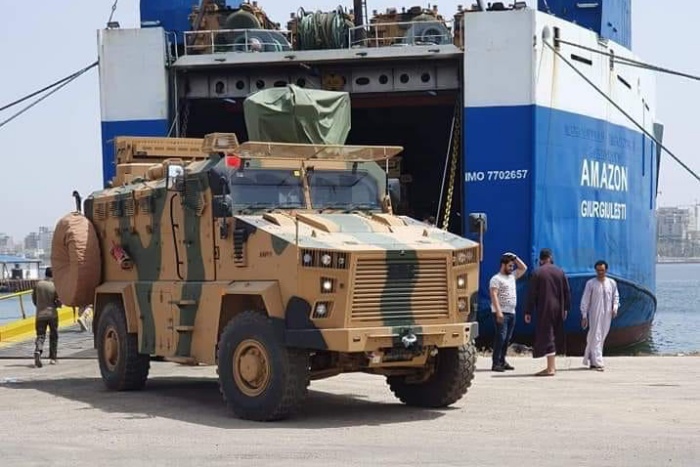Nordic Monitor
The EU reached a deal last week to launch a new Mediterranean naval and air mission in April to monitor the UN-mandated arms embargo on Libya, imposed by UN Security Council (UNSC) Resolution 1970 (2011).
The new mission, named Irini, will increase the operational capacity of ongoing EU efforts led by France and Germany to stop arms shipments to war-torn Libya by Turkey, a candidate country for EU membership.
Irini will replace the EU’s military mission, Operation Sophia. Greece will allow disembarkation of rescued migrants in its ports, and the EU agreed to cover the costs of operation and rescued migrants, Reuters reported. In previous meetings, Austria and Hungary had objected to EU plans to tackle breaches of the UN arms embargo off the Libyan coast due to objections to possible migrant rescues. According to an internal EU non-paper released by Statewatch, the mission will also monitor activities related to oil smuggling.
In January 2020 the French aircraft carrier Charles de Gaulle spotted a Lebanese-flagged cargo ship, the Bana, carrying armored vehicles to Libya under escort by a Turkish frigate. The vessel then was blocked by Italian authorities from leaving Genoa harbor on February 3, 2020. The captain of the Bana admitted that weapons had been loaded onto the ship at the Turkish port of Mersin, then transported to the Libyan capital of Tripoli. The shipment included tanks, howitzers, machine guns and air defense systems.
The UN Panel of Experts on Libya presented a report in December 2019 identifying multiple and routine military equipment (drones, armored vehicles, laser weapons and other arms and ammunition) shipments in 2019 from Turkey by Turkish authorities, companies and individuals in violation of UNSC Resolution 1970. The report noted that a large consignment of Kirpi 4×4 Mine Resistant Ambush Protected (MRAP) vehicles, manufactured by Turkish defense contractor BMC, was offloaded in Tripoli from the Moldovan-flagged MV Amazon on May 18, 2019.
The UN panel was established in 2011 pursuant to UNSC Resolution 1973 (2011) to monitor implementation of the measures and to designate those individuals subject to the measures imposed by Resolution 1970.

Turkey-Libya maritime and security deals signed in November 2019 have shaken up politics in the Mediterranean, with some European and other regional states launching diplomatic and military counter-offensives.
The maritime agreement determines the Turkey-Libya continental shelf and exclusive economic zone (EEZ), while the security deal allows the Turkish government to deploy its troops in Libya and transfer paramilitary SADAT units and jihadists from Idlib to the Mediterranean country.
In conjunction with Turkey’s drilling activities in the eastern Mediterranean, the agreements increased tensions in the region. Paris and Athens have publicly expressed exasperation with Ankara over its regional maneuvers and have led military exercises. The number of joint air and sea exercises that include France, Egypt, Greece, Cyprus, Jordan, Italy and Israel has increased in the region. Some of those activities were supported by the United States.
The Turkey-Libya deals have also accelerated regional diplomatic ties among those countries. For instance, the French and Greek defense ministers revealed the decision to sign a wide-ranging defense and security agreement in the coming months after their meeting in Athens on February 24, 2020. According to the reports, the agreement will include joint naval and land exercises and defense industry cooperation including French frigates, Mirage 2000 fighter jets and NH90 helicopters. A Greek frigate also escorted the aircraft carrier Charles de Gaulle on a mission in the eastern Mediterranean in February.

Prior to the talks with France, Greece’s parliament approved an updated defense agreement with the US on January 30, 2020 allowing the use of Greek military facilities including airbases in Larissa and Stefanovikio. Greece has also signed an F-16 upgrade program worth $1.5 billion with the US.
On February 10, Cypriot Defense Minister Savvas Angelides paid an official visit to Israel and discussed with his Israeli counterpart, Naftali Bennett, ways to promote cooperation between Israeli and Cypriot defense authorities in light of the regional challenges.
The Cypriot and Jordanian defense ministers agreed on the activities for this year on February 19, 2020 in Cyprus and signed a program for bilateral cooperation between the defense ministries that provides for joint exercises with the participation of the special forces of both countries.
Furthermore, Cypriot Defense Minister Angelides revealed his country’s plans for the acquisition of weapons systems or technology from Israel, France and the United States. Angelides also confirmed an order of French surface-to-air Mistral missiles as well as anti-ship missiles worth some 240 million euros.












